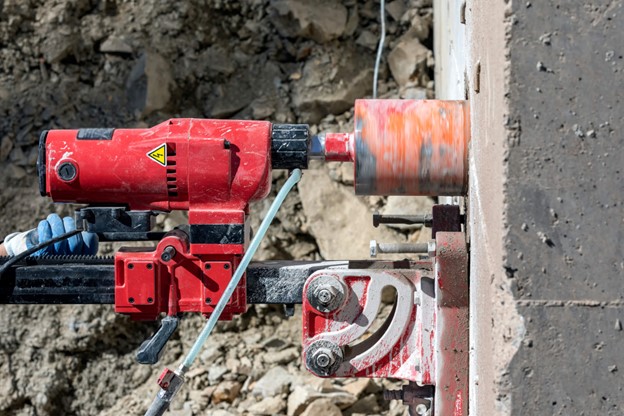Types of Concrete Drilling and Their Applications

Types of Concrete Drilling and Their Applications
Concrete is an incredibly sturdy material used in construction, praised for its durability and resilience. However, working with concrete often requires precise drilling techniques. At Ashton Sawing and Drilling LLC, we specialize in various types of concrete drilling across Texas and Louisiana. Whether you need to accommodate utilities, installations, modifications, or other specific requirements, our team brings the expertise and equipment needed to handle any project with precision. Below, we’ll cover the primary types of concrete drilling and their uses, helping you make informed decisions when hiring a professional.
What Is Concrete Drilling?
Concrete drilling refers to the process of penetrating or creating openings in concrete surfaces, typically to allow the installation of pipes, wires, bolts, or other structural elements. Due to the material’s density and toughness, drilling into concrete requires specialized tools and techniques. Unlike drilling through wood or drywall, concrete offers far more resistance, meaning that using the right equipment is crucial to achieving precision and avoiding unnecessary damage.
Before getting started, one key element to keep in mind is the type of drill and drill bit required. Concrete is no match for standard tools found in most households, which is why equipment like hammer drills for concrete or diamond drills is an industry standard. Additionally, using the right concrete drill bit is crucial—carbide-tipped masonry bits or diamond drill bits are industry standards for achieving clean, precise holes in concrete. Without the proper tools, the job can quickly become frustrating and ineffective, so preparation is key.
Core Drilling: Precision Holes for Every Project
Core drilling involves creating precise, cylindrical holes in concrete using a specialized core drill with a hollow, cylindrical bit. The purpose of core drilling is to extract a “core” or cylinder material while leaving a clean, smooth-edged hole. A diamond core drill is the best tool for core drilling because it delivers precision while effectively cutting through dense materials. Diamond-tipped drill bits are resistant to wear, making them ideal for producing accurate holes in reinforced concrete. When working on a core drilling project, ensure the area is well supported to prevent structural damage. Wet core drilling systems are often preferred to reduce dust and overheating.
Key applications of core drilling include:
- HVAC Systems – Core drilling allows you to install conduit pipes for air conditioning, heating, and ventilation systems.
- Plumbing and Electrical Work – This type of drilling is often used to run wiring and plumbing through walls, ceilings, or floors.
- Infrastructure Projects – Core drilling creates openings for utility lines in bridges, tunnels, or large-scale constructions.
Hammer Drilling: Tackling the Tough Jobs
Hammer drilling combines rotary drilling action with a hammering motion to pulverize concrete as the drill bit rotates. This technique is ideal for harder surfaces and works well for creating smaller holes or openings. A concrete hammer drill is the go-to tool for this type of project. Pair it with a carbide-tipped drill bit, which is specifically designed to handle tough materials like concrete and masonry. When using a hammer drill for concrete, don’t forget to start with lower speeds, gradually increasing the force as the bit penetrates the surface. Prevent issues like cracking by ensuring the bit aligns with your desired angle.
Hammer drilling is mainly used for:
- Fasteners and Anchors – This type of drilling allows you to install bolts or screws in concrete surfaces.
- Roadwork and Infrastructure – Hammer drilling can be used to drill into asphalt or concrete roads for construction or repair purposes.
Diamond Drilling: Effortless Cuts in Concrete and Steel
Diamond drilling is a precise and efficient technique that uses diamond-tipped drill bits to cut through tough materials. Its strength makes it ideal for penetrating reinforced concrete, effortlessly handling both the concrete and the embedded steel. A high-torque diamond drill is crucial for this process, offering smooth, vibration-free operation that minimizes the risk of cracks or structural damage. To ensure optimal performance, water must always be used as a lubricant during drilling. This reduces heat buildup, protects your equipment, and guarantees clean, precise cuts.
Common applications for diamond drilling include:
- Construction and Renovation – Diamond drilling removes reinforced concrete sections for projects like staircases or doorways.
- Historical Restoration – This type of drilling helps preserve architectural integrity while drilling into aged concrete.
- Underwater Drilling – Diamond drilling is often used in coastal or marine infrastructure projects.
Make the Right Choice for Your Concrete Drilling Needs
Concrete drilling is an essential process for a wide variety of construction and renovation projects, ranging from installing fixtures to creating openings for utilities like plumbing, wiring, or HVAC systems. The choice of drilling technique—whether it’s core drilling, hammer drilling, or diamond drilling—depends on the specific project requirements, the materials being drilled, the tools available, and the expertise of the professionals handling the job. Each method offers unique benefits, and using the wrong one can lead to delays, damage, or safety hazards.
If you’re unsure of the best drill for your concrete project, contact us today. Our experienced team is here to assess your needs and guide you through the process. We use advanced tools and proven techniques to ensure your drilling work is completed efficiently, safely, and precisely.
